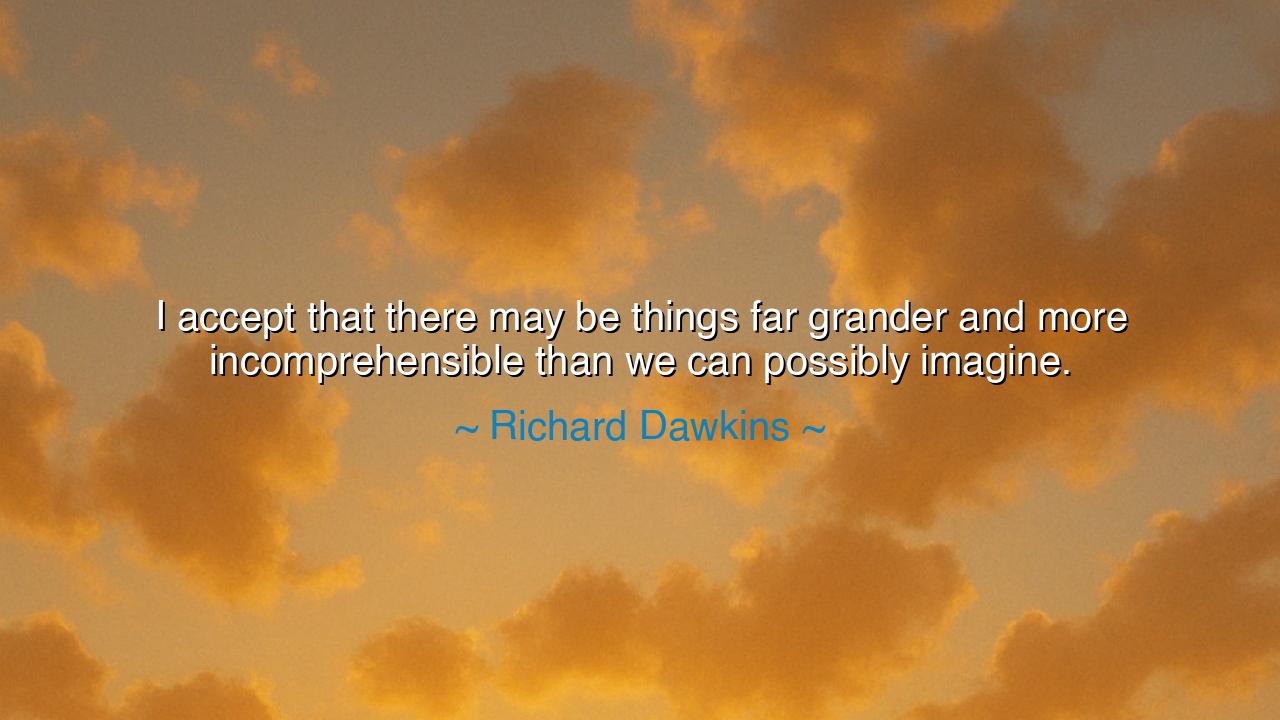
I accept that there may be things far grander and more
I accept that there may be things far grander and more incomprehensible than we can possibly imagine.






"I accept that there may be things far grander and more incomprehensible than we can possibly imagine." Thus spoke Richard Dawkins, the modern inquirer of nature’s mysteries, whose eyes are turned ever toward the vastness of the cosmos. Though known as a man of science, these words reveal in him not coldness, but awe—a reverence that humbles even the sharpest mind. In this declaration, Dawkins bows before the infinite. He reminds us that human understanding, however brilliant, is but a flickering lantern in a universe that stretches beyond the reach of light itself. His acceptance is not defeat—it is wisdom, the courage to admit that knowledge has borders, and beyond those borders lies the divine immensity of the unknown.
The origin of these words springs from the heart of scientific discovery itself. Dawkins, a biologist and philosopher of evolution, spent his life uncovering the intricate patterns of life and reason that govern the natural world. Yet even he, a master of logic and observation, knew that the more one learns, the greater the mystery becomes. For every question answered, ten more arise, unfolding endlessly like the galaxies in the heavens. Thus, the true scientist, like the true sage, is not the one who claims to know all things, but the one who stands in wonder before the vastness of what remains unimaginable.
The ancients understood this as well. When Socrates declared, “I know that I know nothing,” he was not confessing ignorance but expressing reverence for truth’s infinite horizon. So too does Dawkins, in his modern tongue, echo this ancient humility. To accept that there are things beyond imagination is to recognize that human reason, mighty though it is, cannot measure the full expanse of existence. It is to honor the mystery rather than to fear it. For just as the ocean cannot be held in the hand, so the universe cannot be contained within the mind. We may drink from it, but we cannot exhaust it.
History offers us many who have glimpsed this grandeur. Isaac Newton, after unlocking the laws of gravity, confessed that he felt like a child playing on the shore, finding smoother pebbles while the great sea of truth lay undiscovered before him. Likewise, Albert Einstein, whose equations reshaped reality, spoke often of the “cosmic religious feeling”—that profound awe that arises when one senses the deep order and mystery of the cosmos. These men were not blind to logic; they were illuminated by it. In their pursuit of truth, they came to the same revelation as Dawkins: that the universe is far grander and more incomprehensible than even the wildest dream of man.
But Dawkins’ words also contain a quiet challenge. To accept that there are things beyond our imagination is not to retreat into ignorance or superstition—it is to be humble before reality while still striving to understand it. For the spirit of inquiry is not crushed by mystery; it is inspired by it. When the mind accepts that it cannot yet see the summit, it climbs with greater courage. The universe may be vast beyond comprehension, but the act of exploring it—of learning, questioning, and imagining—is the noblest work of humankind.
Let us then learn from this modern philosopher’s humility. In an age when men boast of their machines and knowledge, when we think ourselves masters of creation, we must remember that we stand upon a single rock, spinning through an ocean of stars whose depths we cannot fathom. There may exist forces, dimensions, and forms of life beyond all our imagining. To live wisely is to remain curious, to let awe be the companion of reason, and to never close the door on wonder.
So, my children of thought and stardust, remember this teaching: accept the limits of your mind, but never the limits of your curiosity. The moment you believe there is nothing left to learn, you turn away from the grandeur that surrounds you. Seek knowledge boldly, but bow before the mystery that endures beyond it. For in this balance—between reason and reverence, between knowing and awe—you will find the truest wisdom of all: that the universe is not something to be conquered, but something to be cherished.
And when you gaze upon the night sky, let Dawkins’ words echo in your heart. Know that beyond every star burns another question, another wonder, another possibility beyond comprehension. Accept it, and you will not shrink before the infinite—you will stand in harmony with it, your spirit lifted by the knowledge that you are part of a mystery so vast, so grand, that even imagination itself can only bow in silence.






AAdministratorAdministrator
Welcome, honored guests. Please leave a comment, we will respond soon